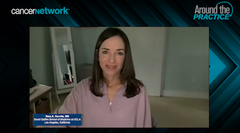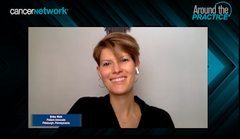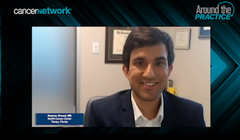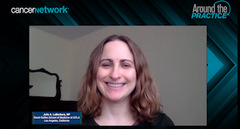
Exciting Developments in the Pipeline in HER2+ MBC
A multidisciplinary panel of health care professionals and a patient advocate comment on their excitement about novel therapies in the pipeline for HER2-positive metastatic breast cancer.
Episodes in this series

Sara A. Hurvitz, MD: Julia, can you give me an idea of what you’re excited about in the HER2 [human epidermal growth factor receptor 2]–positive disease, in terms of promising new therapies or what brings you hope in this field as a closing remark?
Julia LaBarbera, NP: So much has come out in the last few years that’s practice changing, and there’s so much in development. I’m hopeful for this subtype of breast cancer, that this means it’s more of a chronic illness for these women and some men who are diagnosed with this type of cancer. Instead of receiving grave news that they’re going to die from this at some point, people in Erika’s situation who are young when they’re diagnosed can have plenty of life ahead of them that’s really encouraging.
Sara A. Hurvitz, MD: I echo your sentiments. Kamran, what are you most excited about in your subspecialty with respect to management of this disease?
Kamran Ahmed, MD: I’m excited about the potential synergy that radiation therapy can have with systemic therapies. We’ve seen a lot of studies combining radiation therapy with immunotherapies potentially improving the effects of immunotherapy acting as an immune stimulator and also for the potential of combining systemic agents in the brain with stereotactic radiosurgery. The studies have also shown that radiation therapy can help improve the opening of the blood-brain barrier. Potentially, sequencing systemic agents with radiation therapy appropriately can help improve the efficacy of systemic agents in the brain as well.
Sara A. Hurvitz, MD: Thank you so much. I agree completely. Erika, let’s finalize this segment with you. I’d love to hear your thoughts on the future and how we can better support patients on this journey.
Erika Rich: Just keep coming out with all the new treatments and being in the know of what’s coming, because it’s so reassuring listening to you talk about things that are happening and what people are working on. I’m someone who passed the 3-year mark and is looking to take lead at 5, 6, and even 7 years. Because I’m still young, I’d love to get married. Hearing that these treatments are going to be around to help me reach those goals is very exciting, and it’s happening so quickly. Very exciting.
Sara A. Hurvitz, MD: Thank you so much. Thank you to the panelists, Kamran, Julia, and Erika for joining us in this lively discussion on HER2+ metastatic breast cancer, brought to you by Cancer Network®. Thank you to our viewing audience. We hope you found this interactive discussion to be informative and beneficial to your clinical practice.
Transcript edited for clarity.
Newsletter
Stay up to date on recent advances in the multidisciplinary approach to cancer.





































